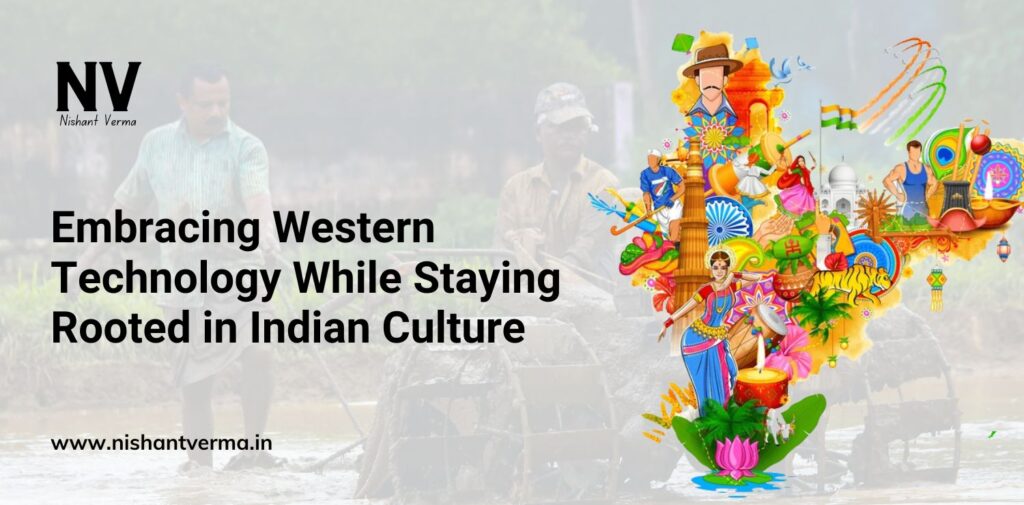India’s journey towards modernization has been greatly influenced by Western technology, bringing about significant advancements in various fields like healthcare, education, and infrastructure. Yet, as we embrace these innovations, it’s crucial to remember our rich heritage and cultural values.
Indian culture, which emphasizes family, spirituality, and community living, has provided us with a unique identity for centuries. Western technology should be seen as a tool to enhance, not replace, our traditional way of life. While technology has made life easier, improved communication, and brought the world closer, the principles of Indian culture, such as respect for elders, love for nature, and holistic living, must not be forgotten.
How Western Technology Transformed India
The adoption of Western technology has indeed revolutionized many sectors in India. From sophisticated machinery in industries to digital platforms connecting millions, technology has opened up new opportunities. For instance, in agriculture, technological advancements have helped increase crop yields, reduce dependency on monsoon seasons, and make farming more sustainable. Similarly, in the education sector, the introduction of e-learning platforms has made quality education accessible to even the remotest parts of the country.
However, while leveraging these tools, it’s essential to be mindful of not losing our essence. There’s a growing concern that rapid modernization might lead to cultural erosion, where younger generations might lean more towards a Western lifestyle, ignoring the values and traditions that form the core of our society.

Why Indian Culture is Important
Indian culture is a blend of thousands of years of wisdom, spirituality, and philosophical thought. The teachings of ancient texts like the Vedas and the Bhagavad Gita offer guidance on leading a balanced life. For example, Ayurveda, a traditional system of medicine, emphasizes harmony between the body and mind, and yoga, which is now popular worldwide, originated from Indian soil. These are testaments to the depth and richness of our heritage.
Even as we navigate through the technological advancements brought by the West, we must remember that Indian culture teaches us to live sustainably, prioritize well-being, and nurture relationships. It’s important for Indians, especially the youth, to take pride in their roots and not blindly follow Western ideals.
The Balance Between Tradition and Modernity
Striking a balance between tradition and modernity is crucial. Western technology should be adapted to Indian needs without compromising cultural values. For instance, while social media platforms connect us globally, they should be used responsibly to promote positivity and cultural pride rather than mindless comparisons.
Instead of viewing Western technology and Indian culture as conflicting, they should be seen as complementary. Using technology to promote traditional arts, crafts, and even languages can help preserve our cultural identity. Several startups and organizations are already using digital platforms to bring attention to indigenous crafts, forgotten cuisines, and lesser-known tourist spots steeped in history.

Lessons from Western Culture
It’s also beneficial to recognize positive aspects of Western culture, such as punctuality, professionalism, and innovation, and integrate them with Indian values like compassion, hospitality, and spirituality. This fusion can create a unique, modern Indian identity that leverages the best of both worlds.
However, we should be cautious not to become overly reliant on Western technology. Developing indigenous technology and innovation should be encouraged to avoid dependency. It’s essential to invest in homegrown tech solutions that are in line with our unique challenges and cultural context.
Preserving Our Heritage in a Tech-Driven World
Our rich cultural heritage is our strength, and it’s what sets us apart in an increasingly homogeneous global culture. We must make conscious efforts to keep it alive. This could be through reviving traditional festivals, encouraging the use of regional languages, or supporting cultural education from a young age. Parents, educators, and community leaders should work together to ensure that the next generation understands and appreciates the significance of their cultural roots.
Moreover, Indian media, cinema, and literature have a responsibility to project a positive image of our culture. This can counterbalance the overwhelming influence of Western media and help nurture a sense of pride in our heritage.

Conclusion: Moving Forward with Pride and Wisdom
In conclusion, while it’s undeniable that Western technology has brought about a wave of positive change in India, it’s equally important to safeguard our cultural identity. As Indians, we should not forget our roots in the quest for modernization. Let’s embrace the advantages of Western technology but always remain anchored in our values and traditions. This harmony between the old and the new will define the true essence of a progressive India.
Let’s be proud of who we are and where we come from. After all, a tree can only grow tall if its roots are strong.




